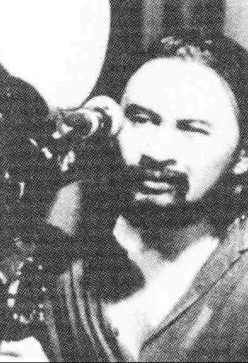Related Research Articles

Agni Pratistha Arkadewi Kuswardono is an Indonesian actress, graphic designer and beauty pageant titleholder who was the winner of Puteri Indonesia 2006 (Miss Universe Indonesia), she represented Indonesia in the Miss Universe 2007 pageant held in Mexico City, Mexico in May 2007, where she won her Best National Costume award.

Teguh Karya was an Indonesian film director. Starting his entertainment career in theatre, he made his directorial debut in 1971 with Wadjah Seorang Laki-Laki in which he also wrote the screenplay. He later directed numerous critically acclaimed films, including Cinta Pertama, Badai Pasti Berlalu, and November 1828. In 2001, Karya died from complications from a 1998 stroke.

Reza Rahadian Matulessy is an Indonesia actor, model, singer and director of Persian and Ambonese descent. He was Chair of the Indonesian Film Festival for the period 2021 to 2023.

Ponirah Terpidana is a 1984 Indonesian drama film directed by Slamet Rahardjo. Starring Nani Vidia, Rahardjo, and Ray Sahetapy, it follows a young woman named Ponirah who becomes a prostitute and is arrested for the murder of a rich businessman. The film, which combined traditional and contemporary elements, was a critical success in Indonesia. It won three Citra Awards at the 1984 Indonesian Film Festival, from a total of eleven nominations.
The Citra Award for Best Director is an award given at the annual Indonesian Film Festival (FFI) to Indonesian film directors in recognition for their achievement in the previous year. The Citra Awards, described by Screen International as "Indonesia's equivalent to the Oscars", are the country's most prestigious film awards and are intended to recognize achievements in films as well as to draw public interest to the film industry.
Nico Pelamonia was an Indonesian actor turned film director who won the Citra Award for Best Director in 1976 for his film Semalam di Malaysia. He has been involved in 33 feature film productions since his debut in Fred Young's Dibalik Awan in 1963.

H Lembu Amiluhur Priyawardhana Priyono, generally referred to as Ami Prijono was an Indonesian film director and actor. He was married to the feminist writer Julia Suryakusuma.
The Citra Award for Best Actress is an award given at the Indonesian Film Festival (FFI) to Indonesian actresses for their achievements in leading roles. The Citra Awards, described by Screen International as "Indonesia's equivalent to the Oscars", are the country's most prestigious film awards and are intended to recognize achievements in films as well as to draw public interest to the film industry.

Miecke Marie De Rijder was an Indonesian actress, model, and politician who won three Citra Awards. She was crowned the best female antagonist in Indonesian film industry along with Suzzanna and Ruth Pelupessy. Wijaya began her career as a teenager and soared to popularity by partaking a role in Usmar Ismail's commercially successful Tiga Dara, her name became increasingly popular after starring in the soap opera Losmen in 1987.

The Citra Award for Best Actor is an award given at the Indonesian Film Festival (FFI) to Indonesian actors for their achievements in leading roles. The Citra Awards, described by Screen International as "Indonesia's equivalent to the Oscars", are the country's most prestigious film awards and are intended to recognize achievements in films as well as to draw public interest to the film industry.
Kanjeng Raden Tumenggung Irwan Susetyo Pakusadewo or better known as Tio Pakusadewo is an Indonesian actor of Javanese descent.
The Citra Award for Best Supporting Actress is an award given at the Indonesian Film Festival (FFI) to Indonesian actresses for their achievements in a supporting role. The Citra Awards, described by Screen International as "Indonesia's equivalent to the Oscars", are the country's most prestigious film awards and are intended to recognize achievements in films as well as to draw public interest to the film industry.

Ng. Ratu Djoewariah was an Indonesian actress active in the 1940s and 1950s.

Rara Patma Dewi Tjitrohadiseikusumo, best known under her stage name Chitra Dewi, was an Indonesian actress and director. She was noted for her roles in Usmar Ismail's films of the 1950s, appearing in films such as Tamu Agung, Tiga Dara, and Pedjuang, although she remained active in cinema until 1993 and won a Citra Award for Best Supporting Actress at the 1979 Indonesian Film Festival for Gara-gara Isteri Muda. Dewi also had a brief stint film directing in 1971, making her one of only six Indonesian women to direct a film before 1998.

Ali Joego was a stage and film actor and director active in the Dutch East Indies and Indonesia. During his twenty-year career he appeared in thirty films and directed seven.

Ratu Tika Bravani, better known as Tika Bravani, is an Indonesian model and actress of mixed Bantenese and Minangkabau descent.

Ali Shahab was an Indonesian film director, screenwriter, journalist, and novelist. Before entering the world of film, Ali was active as a journalist in a number of mass media, one of whom had become the editor in chief of Indonesia Jaya. He has also been a caricature maker, active in the theater, and a novelist. There are at least 20 works of books, including several novels, which have been published from 1969 to 2006. In addition, in the world of cinema, Ali has recorded at least 14 film titles and more than 8 television series and soap operas as directors. As a screenwriter, he is involved in at least 17 films.
Indonesian horror are the films of the horror genre produced by the Indonesian film industry. Often inspired by local folklore and religious elements, Indonesian horror films have been produced in the country since the 1960s. After a hiatus during the Suharto era in the 1990s, when censorship affected production, Indonesian horror films continued being produced following Reformasi in 1998.
References
Footnotes
- ↑ Filmindonesia.or.id, Biography.
- 1 2 3 Filmindonesia.or.id, Filmography.
- 1 2 Viva.co.id, Profile.
- ↑ Anton, 2016.
- ↑ DetikCom, 2008.
- ↑ The Jakarta Post, 2015.
- ↑ Nyata Magazine (in Indonesian). www.nyata.co.id. January 1, 2016. p. 10.
- ↑ Saputra 2016.
- ↑ Munady, 2017.
- ↑ Puspasari, Desi. "Ratu Felisha Resmi Cerai, Ini Deretan Fakta Rumah Tangganya". detikhot (in Indonesian). Retrieved August 13, 2022.
- 1 2 Liudmila & Prayogo, 2004.
- ↑ IMDb, Kuntilanak.
Works cited
- Anton (April 18, 2006). "Ratu Felisha, Rajin Bikin Susu Buat Sang Bayi" [Ratu Felisha, Diligent Make Milk for her Baby]. Kapanlagi.com. Retrieved November 15, 2017.
- "Ratu Felisha | Biografi" [Ratu Felisha | Biography]. filmindonesia.or.id (in Indonesian). Jakarta: Konfiden Foundation. Archived from the original on June 27, 2017. Retrieved November 15, 2017.
- "Ratu Felisha | Filmografi" [Ratu Felisha | Filmography]. filmindonesia.or.id (in Indonesian). Jakarta: Konfiden Foundation. Archived from the original on June 29, 2017. Retrieved November 15, 2017.
- "Profil Ratu Felisha" [Ratu Felisha Profile]. Viva.co.id (in Indonesian). Jakarta: Visi Media Asia. Archived from the original on September 26, 2017. Retrieved November 15, 2017.
- "Guess what?: Ratu Felisha ready to remarry". The Jakarta Post . September 29, 2015. Archived from the original on January 27, 2016. Retrieved November 15, 2017.
- Saputra, Rizky Aditya (April 30, 2016). "Suami Terima Kenakalan Masa Lalu Ratu Felisha" [Husband Accepts Delinquency of Ratu Felisha's Past]. Liputan 6 . Retrieved November 15, 2017.
- Munady (February 22, 2017). "Ratu Felisha Gagal Program Bayi Tabung" [Ratu Felisha Fails IVF Program]. Pikiran Rakyat (in Indonesian). Retrieved November 15, 2017.
- detikHot (February 25, 2008). "Ratu Felisha Nikahi Bule Akhir 2008" [Ratu Felisha Marries Bule End of 2008]. DetikCom (in Indonesian). Retrieved November 15, 2017.
- Liudmila, Tascha; Prayogo, Dono (August 21, 2004). "Buruan Cium Gue! Ditarik dari Peredaran" [Buruan Cium Gue! Withdrawn from Circulation]. Liputan 6 . Retrieved November 15, 2017.
- "Kuntilanak (2006)" [the Chanting (2006)]. imdb.com. Washington: Internet Movie Database . Retrieved November 15, 2017.